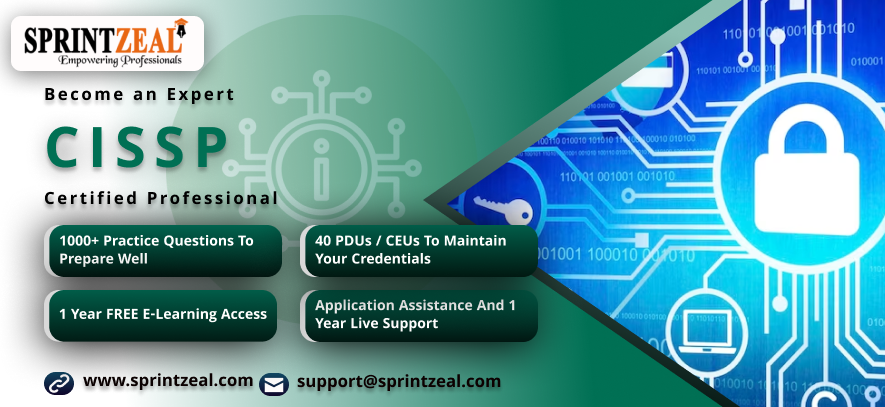
The Certified Information Systems Security Professional (CISSP) certification is one of the most sought-after credentials in the field of information security. It is recognized globally as a standard of excellence for cybersecurity professionals, demonstrating their expertise and commitment to securing information systems. This guide aims to provide an easy-to-follow roadmap for anyone looking to undertake CISSP training, covering key areas such as understanding the certification, preparing for the exam, choosing the right training resources, and developing effective study habits.
Understanding the CISSP Certification
The CISSP certification is administered by the International Information System Security Certification Consortium, or (ISC)². It validates an individual’s ability to design, implement, and manage a best-in-class cybersecurity program. The certification covers a wide range of topics within the field of information security, organized into eight domains:
- Security and Risk Management
- Asset Security
- Security Architecture and Engineering
- Communication and Network Security
- Identity and Access Management (IAM)
- Security Assessment and Testing
- Security Operations
- Software Development Security
These domains collectively cover the essential areas of expertise required to protect an organization’s information assets.
Preparing for the CISSP Exam
Prerequisites
Before you can sit for the CISSP exam, you need to meet certain prerequisites:
- Experience: You must have at least five years of cumulative, paid work experience in two or more of the eight domains of the CISSP CBK (Common Body of Knowledge).
- Endorsement: Once you pass the exam, you need to be endorsed by another (ISC)² certified professional, who can attest to your professional experience.
Understanding the Exam Format
The CISSP exam consists of 100-150 questions and has a duration of three hours. It is adaptive, meaning the difficulty of questions adjusts based on your previous answers. The exam tests both your knowledge and your ability to apply that knowledge in real-world scenarios.
Setting a Study Schedule
Preparing for the CISSP exam requires a structured and disciplined approach. Here are some steps to help you create an effective study schedule:
- Assess Your Knowledge: Start by taking a practice test to identify your strengths and weaknesses.
- Set Realistic Goals: Based on your assessment, set daily and weekly study goals. Ensure these goals are achievable within your available time.
- Allocate Study Time: Dedicate specific times of the day for studying. Consistency is key, so try to study at the same time each day.
- Break Down the Material: Divide the eight domains into manageable sections and focus on one at a time.
- Review Regularly: Regularly review what you have learned to reinforce your knowledge and identify areas that need more attention.
Choosing the Right Training Resources
Selecting the right training resources is crucial for effective preparation. Here are some recommended resources:
Official (ISC)² Training
(ISC)² offers official training courses that are designed to provide comprehensive coverage of the CISSP domains. These include:
- Classroom Training: In-person training sessions led by certified instructors.
- Online Instructor-Led Training: Live, online classes that offer the same level of interaction as classroom training.
- Self-Paced Training: Online courses that you can take at your own pace, allowing for flexibility in your study schedule.
Books and Study Guides
Several high-quality books and study guides can help you prepare for the CISSP exam:
- “CISSP (ISC)² Certified Information Systems Security Professional Official Study Guide” by James M. Stewart, Mike Chapple, and Darril Gibson: This is the official study guide and covers all eight domains in detail.
- “CISSP All-in-One Exam Guide” by Shon Harris and Fernando Maymí: A comprehensive guide that includes practice questions and exam tips.
- “Eleventh Hour CISSP: Study Guide” by Eric Conrad, Seth Misenar, and Joshua Feldman: A concise guide that focuses on the most important concepts for the exam.
Online Resources
In addition to books, there are several online resources that can aid in your preparation:
- Cybrary: Offers free and paid CISSP courses with video lectures and practice questions.
- Udemy: Provides various CISSP courses with video content, quizzes, and hands-on labs.
- (ISC)² Community: An online forum where you can interact with other CISSP candidates and certified professionals to share knowledge and tips.
Practice Exams
Taking practice exams is essential for gauging your readiness and familiarizing yourself with the exam format. Some popular sources for practice exams include:
- Boson: Offers high-quality practice exams with detailed explanations for each question.
- Transcender: Provides practice tests that closely mimic the actual CISSP exam.
- (ISC)² Official Practice Tests: The official practice tests are highly recommended as they are designed by the same organization that administers the exam.
Developing Effective Study Habits
Effective study habits are critical for success in the CISSP exam. Here are some tips to help you study more effectively:
Active Learning
Engage in active learning by taking notes, summarizing information in your own words, and teaching concepts to others. This helps reinforce your understanding and retention of the material.
Practice Questions
Regularly practice with exam questions to familiarize yourself with the format and types of questions you will encounter. Review the explanations for each question to understand the reasoning behind the correct answers.
Hands-On Experience
Where possible, gain hands-on experience with security tools and technologies. This practical experience will help you understand how theoretical concepts are applied in real-world scenarios.
Join Study Groups
Joining a study group can provide motivation and support. Collaborating with others allows you to share knowledge, discuss difficult concepts, and gain different perspectives.
Stay Updated
The field of information security is constantly evolving. Stay updated with the latest developments, trends, and best practices by following industry news, blogs, and forums.
Maintaining Your Certification
Once you have achieved your CISSP certification, you need to maintain it through Continuing Professional Education (CPE) credits. You must earn a minimum of 40 CPE credits annually and 120 credits over a three-year certification cycle. CPE activities can include attending conferences, participating in training, and contributing to the information security community.
Conclusion
Earning the CISSP certification is a significant accomplishment that can open doors to advanced career opportunities in information security. By understanding the certification requirements, preparing diligently, choosing the right training resources, and developing effective study habits, you can successfully pass the CISSP exam and join the ranks of certified cybersecurity professionals. Remember, the journey to becoming a CISSP is not just about passing an exam, but about gaining the knowledge and skills necessary to protect and secure information systems in an ever-evolving threat landscape.






